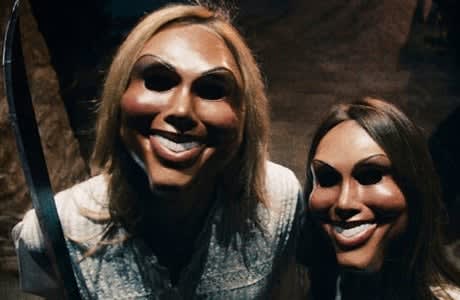Another high concept, low budget, single location horror from Blumhouse, The Purge posits a near future where an id-scratching night of anarchy is put into practice by a desperate American government. This nationwide, ritualized culling has stabilized the economy and the population at the cost of one night of wanton brutality.
Writer/director James DeMonaco doesn't explore this rich conceit further than setting up a blatant morality play between the haves and the have-nots in the middle an otherwise traditional home invasion horror. Ethan Hawke plays the head of the Sandin family, James. As a security system salesman, he and his brood are well provided for and should have nothing to fear, residing in their posh house, located in an affluent neighbourhood. Innocence stirs the hornet's nest when the youngest, Sandin (Max Burkholder), lets a wounded man seek refuge in their home against daddy's orders, eliciting the wrath of a scenery-chewing Patrick Bateman Jr. type and his clan of masked caricatures of right wing extremists.
The audience is familiarized with the level of brutality sanctioned during "the Purge" via news footage played over the opening credits and told how perfectly at peace the masses are with this form of "release" by the carefree classical music scoring the bloodshed. Little smirks of gallows humour like this cut the earnestness of the text; unfortunately, DeMonaco opts to play it straight most of the time. It's a thoughtful film, but one that struggles with tone and comes up short on scares and tension, despite some ingenuity from the cinematography department.
There's only one special feature to entice buyers beyond the moderate appeal of the film and it reveals that DeMonaco had originally conceived of the movie as more of a satire. Embracing the A Clockwork Orange-ness of it all might have caused The Purge to stand out a bit further from the pack. The rest of the surprisingly short, solitary piece of bonus content does the regular song and dance in condensed form: talking heads reveal the genesis of the idea, we get a few peaks behind-the-scenes and that's about it. Hopefully the sequel will give audiences more to talk about.
(Universal)Writer/director James DeMonaco doesn't explore this rich conceit further than setting up a blatant morality play between the haves and the have-nots in the middle an otherwise traditional home invasion horror. Ethan Hawke plays the head of the Sandin family, James. As a security system salesman, he and his brood are well provided for and should have nothing to fear, residing in their posh house, located in an affluent neighbourhood. Innocence stirs the hornet's nest when the youngest, Sandin (Max Burkholder), lets a wounded man seek refuge in their home against daddy's orders, eliciting the wrath of a scenery-chewing Patrick Bateman Jr. type and his clan of masked caricatures of right wing extremists.
The audience is familiarized with the level of brutality sanctioned during "the Purge" via news footage played over the opening credits and told how perfectly at peace the masses are with this form of "release" by the carefree classical music scoring the bloodshed. Little smirks of gallows humour like this cut the earnestness of the text; unfortunately, DeMonaco opts to play it straight most of the time. It's a thoughtful film, but one that struggles with tone and comes up short on scares and tension, despite some ingenuity from the cinematography department.
There's only one special feature to entice buyers beyond the moderate appeal of the film and it reveals that DeMonaco had originally conceived of the movie as more of a satire. Embracing the A Clockwork Orange-ness of it all might have caused The Purge to stand out a bit further from the pack. The rest of the surprisingly short, solitary piece of bonus content does the regular song and dance in condensed form: talking heads reveal the genesis of the idea, we get a few peaks behind-the-scenes and that's about it. Hopefully the sequel will give audiences more to talk about.
